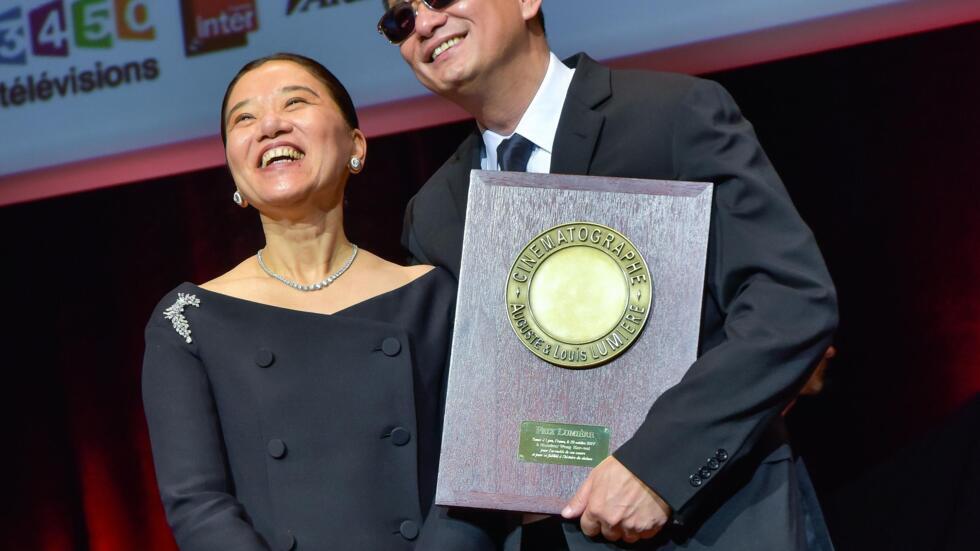Wong Kar-Wai dedicates French award to 'my wife, my muse'
Receiving the 2017 Lumière award for lifetime achievement in the French city of Lyon on Friday, Chinese director Wong Kar-wai dedicated the honour to his wife, whose name, he pointed out, is the first to appear on all his films' credits.
Issued on: Modified:

“All the wonderful female characters in my films have a glimpse of my wife Esther in them,” said 59 year-old Wong. “I dedicate this award ... to my muse.”
With a background in graphic arts, Wong worked as a scriptwriter for years before inventing a new kind of cinema in Hong Kong in the 1980s and 90s.
His characters are mysteriously raw often smouldering with emotions and sensuality.
The city of Hong Kong plays a striking role in most of his 10 feature films.
Not linear or easy to follow, his movies pull the audience from start to finish with a strong emotional thread, and with the sounds of music. He gives his actors the means to reinforce it either with words or with their bodies.
Striving for the best
Maggie Cheung and Tony Leung have worked in several of Wong's films and he has worked with the same cinematographer, Christopher Doyle, on half of them.
According to Doyle, Wong pushes every member on the team to surpass themselves, for each other and for the film.
“He always asks ‘Is that the best you can do?’ And so you do better,” said the Australian who has made Hong Kong his home.
Wong was “overwhelmed” by the award which he received from French actress Isabelle Adjani, who shares his trademark of wearing sunglasses in public.
He explained that Esther was his mainstay and that's why her name was the first on his film's credits.
Lyon in cinema history
The festival's host city, Lyon, was the home of the Lumière Brothers who made the very first moving pictures and have given the name to the award.
Acknowledging its special place in cinema history, Wong captivated the audience with the story of a 19th-century Chinese magician who, after seeing their first moving images in The Train Arriving at La Ciotat, gave up conjuring to become a filmmaker.
Now, said Wong, “Thanks to the Lumière Brothers, we do magic.”
Veteran French filmmaker Bertrand Tavernier, who is president of Lyon's Institut Lumière, waxed eloquent in appreciation of Wong’s oeuvre.
It performs “a choreography of solitude” where “temporality weighs on the story-telling", he declared, praising In the Mood For Love (2000) as a “telescope of emotions”.
Hong Kong's cinema-poet
"I'm happy and I'm proud," Ying Ying, a Lyon resident originally from China, told RFI as she eagerly awaited a screening of Wong's Fallen Angels (1995). "He's a pioneer. It's a pleasure to see his films. And now more people will know about Chinese films."
Even in a big city like Lyon, she feels starved of her native country's culture and has been delighted to watch the ceremony and be able to see so many of Wong's films in the past week, in the original Mandarin or Cantonese in most cases.
The former husband of Maggie Cheung (As Tears Go By, The Years of The Wild, Ashes of Time, In the Mood for Love, 2046), French film director Olivier Assayas also paid tribute to Wong, describing him as “above all, a cinema-poet”.
He added that Wong’s films were “built on the ephemerality of pre-1997 with a desire to show everything he could before Hong Kong might change completely [after the handover]”.
Wong had said earlier in the day that in the years before 1997 everyone in Hong Kong, notably journalists, were asking what was going to happen.
It was overbearing, he said, and he wanted to make a film as far away as possible.
He escaped to Argentina to make Happy Together a love story between two men. “We didn’t know if censorship would apply after 1997 so we made a gay film then.” The film was a big success, winning Wong the Best Director's prize at Cannes in 1997.
"There was a political driving force in that film, " the film director said.
"Our fears of censorship have not been born out," said Wong in press conference on Saturday. "Hong Kong still remains a special place for making films, it still doesn't come under the Chinese censor board."
The title of Wong's film 2046 refers to the 12 months which will preceed the 50th year after the handover from British rule when Hong Kong's Basic Law, negotiated between Beijing and Whitehall as a separate mini-constitution, is due to expire.
Daily newsletterReceive essential international news every morning
Subscribe